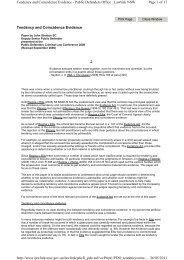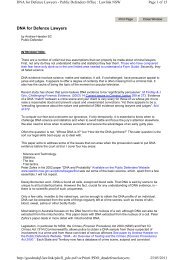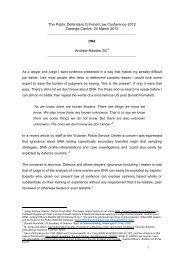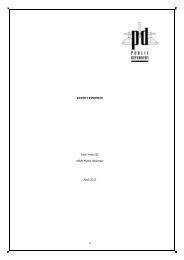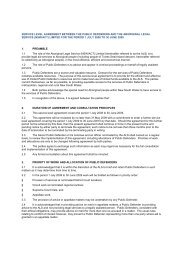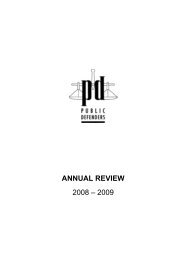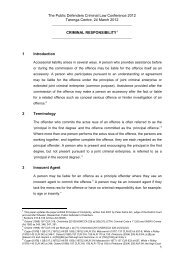Right to Silence: inferences from silence - The Public Defenders
Right to Silence: inferences from silence - The Public Defenders
Right to Silence: inferences from silence - The Public Defenders
You also want an ePaper? Increase the reach of your titles
YUMPU automatically turns print PDFs into web optimized ePapers that Google loves.
itself ((2003) 36 EHRR 162). Two strands of authority, one proceeding <strong>from</strong> Betts [2001] 2<br />
Cr App R 257, and the other <strong>from</strong> Howell [2005] 1 Cr App R 1 and Knight [2003] EWCA Crim<br />
1977 had been regarded as in conflict, with Betts favouring a subjective test (did the<br />
accused genuinely rely on legal advice?) and Howell and Knight an objective test (did the<br />
accused reasonably rely on legal advice?).<br />
<strong>The</strong> court in Beckles adopted the reconciliation of the two strands proposed by Auld LJ in<br />
Hoare [2005] 1 WLR 1804, which accepts that ‘genuine reliance by a defendant on his<br />
solici<strong>to</strong>r’s advice <strong>to</strong> remain silent is not in itself enough <strong>to</strong> preclude adverse comment’. Auld<br />
LJ went on:<br />
“It is not the purpose of section 34 <strong>to</strong> exclude a jury <strong>from</strong> drawing an adverse<br />
inference against a defendant because he genuinely or reasonably believes that,<br />
regardless of his guilt or innocence, he is entitled <strong>to</strong> take advantage of that<br />
advice <strong>to</strong> impede the prosecution case against him. In such a case the advice is<br />
not truly the reason for not mentioning the facts. <strong>The</strong> section 34 inference is<br />
concerned with flushing out innocence at an early stage, or supporting other<br />
evidence of guilt at a later stage, not simply with whether a guilty defendant is<br />
entitled, or genuinely or reasonably believes that he is entitled, <strong>to</strong> rely on legal<br />
rights of which his solici<strong>to</strong>r has advised him. Legal entitlement is one thing. An<br />
accused’s reason for exercising it is another. His belief in his entitlement may be<br />
genuine, but it does not follow that his reason for exercising it is …”<br />
In Hoare, the defence produced at trial for producing a Class B drug was that H believed he<br />
was involved in the secret production of a cure for cancer. H had given a ‘no comment’<br />
interview following legal advice, the solici<strong>to</strong>r apparently having thought that there was<br />
insufficient disclosure of the evidence against H at that stage. Under cross-examination, H<br />
said that, while he could have given his explanation at the time, he had been stunned and<br />
surprised, had not had much sleep, and ‘most people would act on the advice of their<br />
lawyer’. <strong>The</strong> true question, however, according <strong>to</strong> Hoare, is not whether H’s solici<strong>to</strong>rs rightly<br />
or wrongly believed that H was not required <strong>to</strong> answer the questions, nor whether H<br />
genuinely relied on the advice in the sense that he believed he had the right <strong>to</strong> do so. <strong>The</strong><br />
true question is whether H remained silent ‘not because of that advice but because he<br />
had no or no satisfac<strong>to</strong>ry explanation <strong>to</strong> give’. See also Essa [2009] EWCA Crim 43,<br />
where the court adds the rider that in such cases the court may wish <strong>to</strong> pause and consider<br />
whether a s. 34 direction helps the jury (e.g., where the defence at trial is a simple denial of<br />
presence).<br />
In Howell [2005] 1 Cr.App.R. 1 the Court of Appeal noted at paragraph 24 that :<br />
“the kind of circumstances which may most likely justify <strong>silence</strong> will be<br />
such matters as the suspect’s condition (ill-health, in particular mental<br />
disability; confusion; in<strong>to</strong>xication; shock, and so forth – of course we are not<br />
laying down an authoritative list), or his inability genuinely <strong>to</strong> recollect events<br />
without reference <strong>to</strong> documents which are not <strong>to</strong> hand, or communication<br />
with other persons who may be able <strong>to</strong> assist his recollection. <strong>The</strong>re must<br />
always be soundly based objective reasons for <strong>silence</strong>, sufficiently cogent<br />
and telling <strong>to</strong> weigh in the balance against the clear public interest in an<br />
account being given by the suspect <strong>to</strong> the Police”.<br />
Waiver of Privilege and Statements<br />
<strong>The</strong> accused who wishes <strong>to</strong> give an account of his reasons for <strong>silence</strong> following legal<br />
advice may find it hard <strong>to</strong> do so without waiving privilege.<br />
Colin Wells July 2013 Page 12



